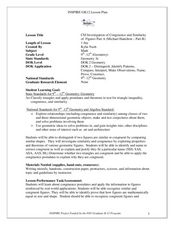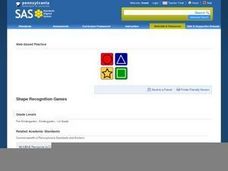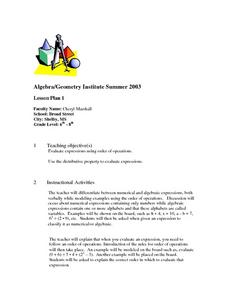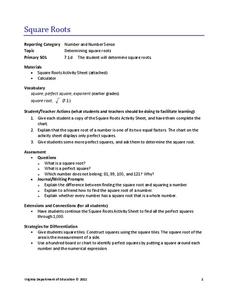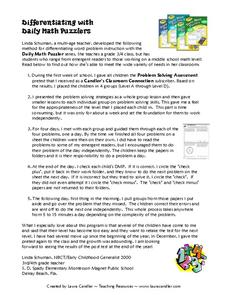Curated OER
Slope and Tangent
Students differentiate between the slope and the tangent of the horizontal. In this precalculus lesson, students examine slopes created by tangent lines. They observe the angle formed using properties of the unit circle.
Curated OER
Compass Designs
Young scholars investigate the properties of two and three dimensional objects. In this geometry lesson, students differentiate polygons based on similarity and congruence. They make observation and interpret the data.
Curated OER
CSI Investigation of Congruence and Similarity
Students differentiate between similarity and congruence using polygons. In this geometry lesson, students label triangles based on their properties. They find missing sides and angles using the interior sum theorem.
Curated OER
Analyzing Body Angles
Students investigate angles of polygons. In this geometry lesson, students identify the relationship between angles and the number of sides in a polygon. They differentiate between sumilarity anf congruence in angles and sides.
Curated OER
Studying Special Segments in Triangles
Students investigate special segments in triangles. For this geometry lesson, students graph, compare, estimate and predict findings based on their data. They differentiate between similarity and congruence of triangles.
Curated OER
Functions in Motion
Students graph polynomials functions and analyze the end behavior. In this algebra activity, student differentiate between the different polynomials based on the exponents. They use a TI to help with the graphing.
Curated OER
Quadrilateral Bunny
Students identify the properties representing quadrilateral. In this geometry lesson, students differentiate between special and regular quadrilaterals. They discuss and demonstrate hierarchy of quadrilaterals.
Curated OER
Sum of Interior/Exterior Angles with Wilbur
Students identify the interior and exterior measures of polygons. In this geometry lesson, students identify the formula for interior angles of polygons. They differentiate between triangular and polygons angles.
Curated OER
Number Recognition Games
Students explore number sense by participating in a math recognition activity. In this number identification lesson, students practice pronouncing names of numbers and matching the number with an amount of objects. Students practice...
Curated OER
Shape Recognition Games
Students explore shapes. In this math activity, students identify basic geometric shapes. Students complete activities in which they identify shapes, symbols and letters. Students draw geometric shapes.
Curated OER
The Sum of All Angles
Young scholars add up the different angles using the angle addition postulate. In this geometry instructional activity, students differentiate between interior and exterior angles. They calculate the different angles for triangles and...
Curated OER
Data Analysis Digital Display
Students create a survey online. In this math lesson, students graph survey data using flisti.com. They share and analyze their classmates' histogram.
Curated OER
A Vacation Expedition: Universal Design and Differentiated Instruction Lesson
Students plan a vacation to either a mountain, deep-sea location, rainforest or to the moon. In this vacation planning lesson, students research information about the location of their choice. They watch video clips on the SMARTBoard,...
Curated OER
The Method of U-Substitution
In this calculus activity, students solve problems using U-Substitution. They find antiderivatives using indefinite integrals. There are 18 questions with an answer key.
Curated OER
Integration of Trigonometric Integrals
In this trigonometry worksheet, students use integration to solve for the six different trigonometric identities. They use indefinite integrals to solve problems. There are 27 questions with an answer key.
Curated OER
Evaluating Using The Order of Operations
Scholars are introduced to the usage of the Order of Operations. They explore the use of variables and how they are represented by any letter of the alphabet. They then engage in discussion for verbal assessment.
Virginia Department of Education
Scientifically Speaking
Explore the connection between operations with scientific notation and the laws of exponents. Scholars work on a set of word problems involving operations with scientific notation. Along the way, they consider how the laws of exponents...
Virginia Department of Education
Square Roots
Square away any doubts about using a new resource. Pupils learn about squares and square roots in the mini-instructional activity. They complete a worksheet identifying roots of perfect squares up to 400.
Curated OER
Differentiating with Daily Math Puzzlers
Young scholars practice word problems based on their own needs and skill levels. In this math word problems lesson, students practice completing one word problem each day until they can move on to the next level.
Curated OER
Inductive vs. Deductive Proof
Twelfth graders differentiate between inductive and deductive proofs. In this differentiating between inductive and deductive proofs lesson, 12th graders compare strengths and weaknesses of each type of proof. Students discuss an...
Curated OER
Snell's Law Proof
For this proof worksheet, students use differentiation and the low of refraction to prove that the path of minimum time occurs when dt/dx = 0. The complete solutions is provided.
Curated OER
An Introductions to Congruent Polygons
Learners differentiate between similar and congruent polygons. For this geometry lesson, students define the theorems and reasons for polygons similarity and congruence. They are given pictures and patterns to differentiate and identify.
Curated OER
Introduction To Functions
Students define a functions and solve problems using functions. In this algebra lesson, students differentiate functions from non-functions. They differentiate between polynomials of higher degrees.
Alabama Learning Exchange
Meteor or Meteorite
Students differentiate between a meteor and meteorite. They participate in an experiment to discover how the size and weight of an object determines the size of the impact crater. They utilize their math skills by measuring with a ruler...




